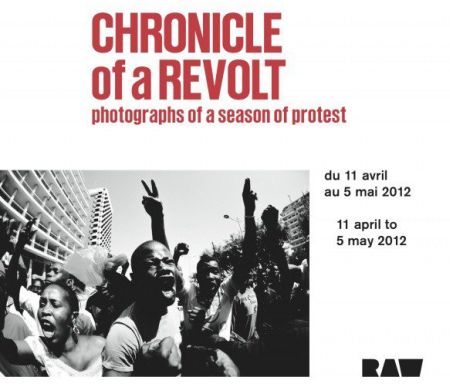CHRONICLE OF A REVOLT
photographs of a season of protest
curated by Koyo Kouoh and Camille Ostermann
Raw Material Company, center for art, knowledge and society
4074 bis Sicap Amitié 2 - Dakar
11/04/2012 - 05/05/2012
One evening in January 2011, as an interdisciplinary group of journalists, poets, rappers and hip-hop artists gather for a tea session and debating on current affairs, comes one of the numerous power outages. This was one outage too much. They launch the movement Y’en a marre (enough is enough!) to raise consciousness about and begin civic actions against mal-governance. This is considered to be the origin of what became a massive social revolt, unprecedented in Senegal thus far.
On 23 June 2011, as the National Assembly prepares to vote a constitutional bill introduced by President Wade, which would allow candidates for presidential election to be elected through a double bid proposing a President and a Vice President with only 25 % of votes, there is a strong mobilization of people and opposition parties. They meet on Place Soweto, in front the National Assembly, to protest against this vote. This attempt to amend the constitution is seen by most citizens as a serious breach of the established republican rules and as a violation of the democratic tradition. It is also perceived by the national and international community as a preparation for an electoral coup from the part of President Abdoulaye Wade, who enjoys a very comfortable majority in the parliament. Wade was due to step down in February 2012, and his suspected of clinging to power.
These two events build the foundation of a long series of street protests, civic actions and political mediation of which clashes between protesters and police will be the most visible reflection.
The exhibition CHRONICLE OF A REVOLT: photographs of a season of protest is a time document of a season of intense political and social activity that fortunately led to the peaceful democratic outcome of the recent presidential election in Senegal. Twenty photographers, mostly Senegalese, present their stories of this process of social and political battle. It is the tale of Senegal’s commitment to democracy, social dialogue and stability combined with a strong desire for change of leadership and respect of constitutional laws.
Curated by Koyo Kouoh and Camille Ostermann, the exhibition shows more than 300 works of Alioune Mbaye, Amadou Mbaye, Antoine Tempé, Cheikh Ahmed Tidjane Ndiaye, Christof E, Elise Fitte-Duval, Erick Christian Ahounou, Elias Aba Milki, Gabriela Barnuevo, Jacques Daniel Ly, Jean-Baptiste Joire, Mamadou Gomis, Rebecca Blackwell, Rose Skelton, Sidy Mohamed Kandji, Sidy Yansane, Sylvain Cherkaoui, Toure Béhan and videos by Tamsir Ndir
The exhibition comes with a highly illustrated 424 pages catalogue including a reader with an interview and essays by social and political activists Alioune Tine, Faldel Barro, Moctar Fall, writers Alpha Amadou Sy, Boubacar Boris Diop, Ibrahima Wane, Mame Aly Konte, artist Issa Samb, political scientist Ismaila Madior Fall and historian Penda Mbow.
photographs of a season of protest
curated by Koyo Kouoh and Camille Ostermann
Raw Material Company, center for art, knowledge and society
4074 bis Sicap Amitié 2 - Dakar
11/04/2012 - 05/05/2012
One evening in January 2011, as an interdisciplinary group of journalists, poets, rappers and hip-hop artists gather for a tea session and debating on current affairs, comes one of the numerous power outages. This was one outage too much. They launch the movement Y’en a marre (enough is enough!) to raise consciousness about and begin civic actions against mal-governance. This is considered to be the origin of what became a massive social revolt, unprecedented in Senegal thus far.
On 23 June 2011, as the National Assembly prepares to vote a constitutional bill introduced by President Wade, which would allow candidates for presidential election to be elected through a double bid proposing a President and a Vice President with only 25 % of votes, there is a strong mobilization of people and opposition parties. They meet on Place Soweto, in front the National Assembly, to protest against this vote. This attempt to amend the constitution is seen by most citizens as a serious breach of the established republican rules and as a violation of the democratic tradition. It is also perceived by the national and international community as a preparation for an electoral coup from the part of President Abdoulaye Wade, who enjoys a very comfortable majority in the parliament. Wade was due to step down in February 2012, and his suspected of clinging to power.
These two events build the foundation of a long series of street protests, civic actions and political mediation of which clashes between protesters and police will be the most visible reflection.
The exhibition CHRONICLE OF A REVOLT: photographs of a season of protest is a time document of a season of intense political and social activity that fortunately led to the peaceful democratic outcome of the recent presidential election in Senegal. Twenty photographers, mostly Senegalese, present their stories of this process of social and political battle. It is the tale of Senegal’s commitment to democracy, social dialogue and stability combined with a strong desire for change of leadership and respect of constitutional laws.
Curated by Koyo Kouoh and Camille Ostermann, the exhibition shows more than 300 works of Alioune Mbaye, Amadou Mbaye, Antoine Tempé, Cheikh Ahmed Tidjane Ndiaye, Christof E, Elise Fitte-Duval, Erick Christian Ahounou, Elias Aba Milki, Gabriela Barnuevo, Jacques Daniel Ly, Jean-Baptiste Joire, Mamadou Gomis, Rebecca Blackwell, Rose Skelton, Sidy Mohamed Kandji, Sidy Yansane, Sylvain Cherkaoui, Toure Béhan and videos by Tamsir Ndir
The exhibition comes with a highly illustrated 424 pages catalogue including a reader with an interview and essays by social and political activists Alioune Tine, Faldel Barro, Moctar Fall, writers Alpha Amadou Sy, Boubacar Boris Diop, Ibrahima Wane, Mame Aly Konte, artist Issa Samb, political scientist Ismaila Madior Fall and historian Penda Mbow.
